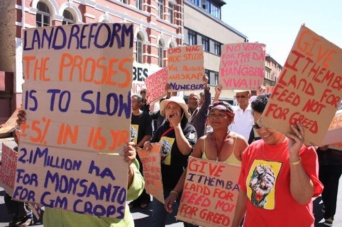- About
- Topics
- Picks
- Audio
- Story
- In-Depth
- Opinion
- News
- Donate
-
Signup for our newsletterOur Editors' Best Picks.Send
Read, Debate: Engage.
| located: | South Africa |
|---|---|
| editor: | Bob Koigi |
The decades-long debate on land redistribution and racial segregation in South Africa has now reached epidemic proportions, with the local population expressing frustration over the snail-paced rate of reforms. It all stems from a sense of segregation among black South Africans who feel that over the years they have been alienated in their own country, with large tracts of land being owned by White South Africans.
This is a phenomenon that hinges on archaic laws like the 1913 Native Land Act that advanced racial discrimination in land ownership. The apartheid then galvanised this practice with White South Africans, who were the minority, owning huge pieces of fertile land while pushing black inhabitants to small parcels or no land at all.
Official data indicate that whites own 72 percent of land in South Africa with 4 percent owned by locals, despite the black South Africans accounting for more than three-quarters of the population.
For political reasons or otherwise, the government is now mulling over the amendment of the constitution to allow land and property expropriation without compensation. The debate has divided the country right down the middle and even drawn the reaction of world leaders including President Trump, who has warned of sanctions and dire consequences should the South African government continue harassing White landowners. The truth has been the victim as each side advances arguments in their favour.
Proponents of these reforms insist that giving back idle land taken from the locals is a crucial step in addressing historical injustices and creating cohesion. Opponents, on the other hand, argue that this amounts to land grabbing which will discourage investors and have serious negative effects on the economy in the long run.
Land is an emotive subject the world over. While there are genuine reasons to reverse the land and property inequalities in South Africa, these expropriations need to be done in a fair, just and humane way. South Africa remains one of the continent's most powerful economies and to avoid a meltdown, it should seize advancing violent land seizures as happened in Zimbabwe, which brought the country’s economy to its knees. The voice of everyone must be heard and respected. At the end of it all, it is no walk in the park. Compromise will ultimately save the rainbow nation.
Photo: Farmland Grab
